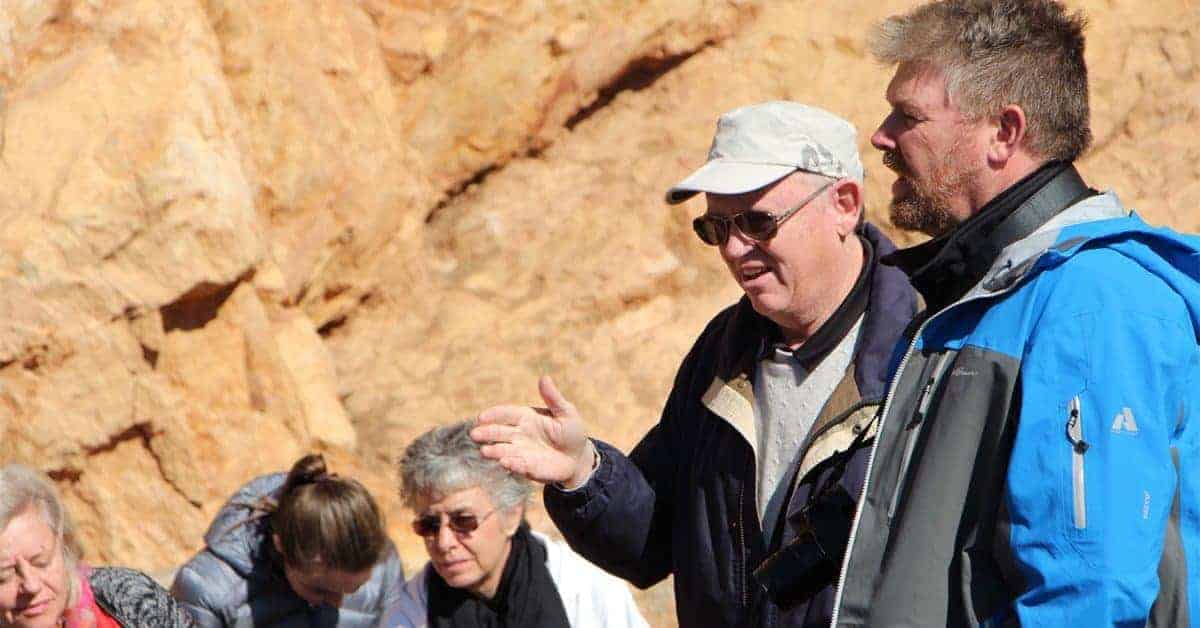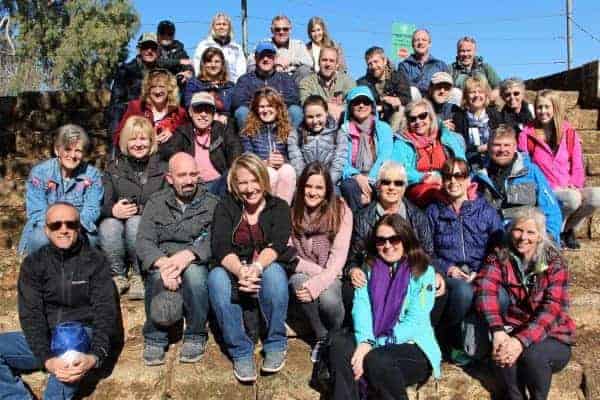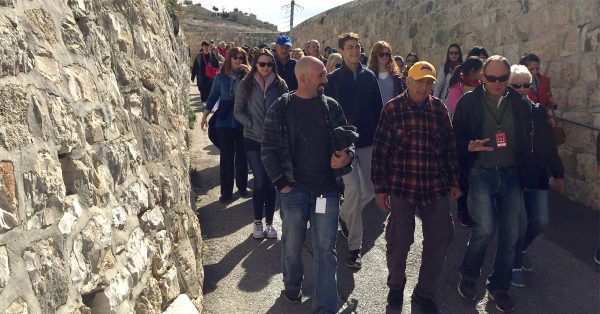Who’s Afraid of The Big, Bad Shack?
Who’s Afraid of The Big, Bad Shack?
By Wayne Jacobsen
It turns out quite a few people are.
As the movie adaptation of The Shack is set to release on March 3, I’m hearing increasing rumblings from people who want to denounce the story as dangerous for Christians to see. Mention the movie in your Facebook feed and you’ll hear from at least a few of your friends or family decrying it as heresy and judging those as fools who’ve been touched by its story.
Since I co-wrote the book and helped start the publishing company that distributed it, I often hear from some of these directly. A man wrote me last week concerned that the book distorts the Trinity, teaches that God is a woman, and promotes universalism. His email began like so many others, “I’ll be honest, I’ve never read The Shack, but…,” and then he launched into an all-to-familiar litany of misinformed interpretations of the book. And of course he’s concerned for the danger it represents to “the young in faith and those just growing in their understanding of God.”
It amazes me how people draw such certain conclusions from a book they’ve never bothered to read. I didn’t take the bait. It makes no sense to me to discuss a book with someone who hasn’t read it. We’d only be discussing his ignorance. Surprisingly most of those who have taken up my challenge to read it in a conversation like this have come back surprised that it wasn’t what they thought and tell me how deeply it touched them.
Why are people so afraid of a work of fiction? It’s not going to bite you. It’s not going to convince you something is true if you know already that it isn’t. And your fears just may rob you of an experience that many others have found so valuable in their own relationship with God.
The trouble is most of the accusations launched against The Shack aren’t even true, which makes me wonder what is really going on here. One pastor listed thirteen heresies in The Shack and I would disagree that The Shack promotes twelve of them and the other one isn’t actually a heresy. Like him, many quote a phrase from the book to justify an accusation, but ignore the rest of the story that argues against the very conclusion they want it to make. Amazingly not one of these people ever talked to someone involved with the book to find out if their judgments have merit.
One of the early detractors for The Shack was trying to build a cottage industry out of being the anti-Shack guy. He called me a few months after it was published offering to write a devotional guide to go along with the book. I asked him what he had in mind and he told me he wanted to help people mine the deep truths we’d written about. Having read his previous disdain for the book, I confronted him for his dishonesty. He didn’t want to unpack the story for people, but to attack it. He was surprised I knew and quickly hung up.
Spurious Accusations
Why are people so adamant about distorting the message of the book to scare people from reading it or from seeing the movie?
Some accused us of teaching that God is a woman when none of us who wrote The Shack believe that to be true. One even accused us of indoctrinating people into a black, Madonna, Hindu cult, whatever that is. You just have to make that stuff up.
The characterization in the book doesn’t speak to God’s gender, but through whom he chooses to reveal himself. For Paul Young and his family it was a black woman just like the one described in the book who first demonstrated the love of God to them in a brutal circumstance when few others would dare. In the story, Mack’s image of a father is severely broken by the abuse he suffered, so God comes to him through someone he can relate to. What it seeks to underscore is that God is Spirit and though he doesn’t have a physical body and gender as we do, Genesis assures us that both masculinity and femininity express the nature of God. This is more about Incarnation that God’s gender identity. The point is that he can reveal himself as easily through a black woman as a white male, an Asian senior, or a Latino child. It doesn’t get more Incarnational than that.
Some accused us of modalism, the idea that God is one person who takes on different forms at different times. They base this conclusion on one paragraph showing the wounds of the crucifixion on the Father’s character. They wrongly conclude that we believe the Father was crucified when the point in the book is that God didn’t abandon his Son even on the cross. He was “in Christ reconciling the world to himself.” Because Jesus took on our shame as well as our sin, he felt abandoned because he could no longer see the Father who was right there with him.
We were using a literary convention to convey the closeness between them, not as a depiction of modalism. To get to that conclusion you have to ignore the fact that the three persons of the Trinity spend most of the story in the same room interacting, loving and honoring each other. Of the theologians who wrote us in the first couple of years of the book’s release, 80% told us what we expressed about the relationship inside the Trinity was exactly as they see it. Only 20% took exception to it. But who knows for sure? The Trinity is an amazing mystery that defies description in our corporeal world. We could only depict it as loving, mutual relationships inside the one God.
Perhaps the most problematic accusation is that The Shack promotes universalism, the belief that everyone gets salvation in the end. Some who advance this idea quote from Paul Young’s paper for a think tank written before The Shack. Even today he describes himself as a “hopeful universalist”. However, Paul isn’t the only author of this story.
The original manuscript that became The Shack, was a rough cut of an endearing tale about God and suffering that Young had written for his children to explain his views of God. When he first sent me the manuscript, universalism was a significant component in the resolution of that story. When he asked for my help in publishing the book, I told him I wouldn’t work on it if that was his answer to human suffering. I didn’t agree with it and thought it would hamper efforts to reach the audience that would most benefit from the book.
Paul hoped to convince me I was wrong and sent me his paper on universalism. We spent some time discussing it, but in the end I felt it took too much linguistic gymnastics to bend Scripture to that conclusion. As I have friends who believe in universal salvation, it’s not a view I’m afraid of; it’s just one I don’t share. And regardless of what any of us believes, God will resolve this age exactly the way he has planned. I don’t have to figure it all out, but trust it to the God I know. However, nothing Jesus, Paul, or John said points me to the conclusion that everyone receives salvation. In fact they warn of significant consequences in the age beyond for refusing God’s love in this one. I do believe God’s love is universal and his desire is for everyone to be saved, but that transaction involves a response from us.
At that point the conversations between God and Mack were a set of questions and answers, more like Sunday school lessons, interesting dialog surely but not yet a story of healing. To turn this into a book and later a movie, a friend of mine, Brad Cummings, and I discussed the need for those conversations to be more directed, moving Mack from anger and brokenness into freedom and healing. When we shared it with Paul he loved the idea. I explained to him exactly how to do rewrite it but he was reticent to do it on his own and begged us to rewrite it for him. “I’m done with it,” he told me one day. “If this book goes anywhere it’s because you’ll get involved.”
He agreed to let us take out the universalism theme saying he was less certain about it than when he wrote the first draft. So when people tell me that The Shack promotes universalism, I know it doesn’t because Brad and I don’t embrace it and when we rewrote the story in four different drafts over 16 months, we took it out.
Instead we wrote a story about God’s ability to find Mack in his brokenness and let his love invite him into truth and wholeness. Mack’s responses at every point are critical to the story. These quotes clearly set it apart from universalism:
“All I am telling you is that reconciliation is a two way street, and I have done my part, totally, completely, finally. It is not the nature of love to force a relationship but it is the nature of love to open the way.”
* * * *
“Does that mean,” asked Mack, “that all roads will lead to you?”
“Not at all,” smiled Jesus as he reached for the door handle to the shop. “Most roads don’t lead anywhere. What it does mean is that I will travel any road to find you.”
* * * *
Now (evil) touches everyone that I love, those who follow me and those who don’t. If I take away the consequences of people’s choices, I destroy the possibility of love. Love that is forced is no love at all.”
* * * *
The Real Controversy
One day I got a call from a church bookstore manager angry that we had included curse words in the book. I wasn’t sure what he was talking about and he reminded me that toward the end of the book, Mack calls his daughter’s murderer a son of a bitch as he wrestles with forgiving him. “My pastor won’t let me carry the book because of that.”
“Really?” I inquired further. “If it wasn’t there, everything else with the book is fine?”
He had to admit that it wasn’t. His pastor had other concerns, of course. The one curse word was only an excuse that others couldn’t argue with. It reminded me of Jesus healing people on the Sabbath. While nothing in the law forbid healing, it was something the Pharisees could point out to discredit him with the people. “We’re fine with him healing, he just shouldn’t do it on the Sabbath.” Sure!
I sense that with these many of the other accusations as well. They don’t stand up to the simplest reading of The Shack and seem forced on it by someone who has other issues they are not willing to admit. For some it may have been more about “black” than “woman”, but know that wouldn’t be well received. Or perhaps they didn’t like how gracious and playful Papa was with Mack. The story we wanted to tell was the story of a loving Father finding his way through all the pain, loss, and false accusations to reconnect with one of his children who was lost in his depression.
For the Pharisees Jesus was also too kind and compassionate with sinners, and not enough engaged with the religious elite of his day. He claimed to be a man of God but didn’t fit the mold the teachers of the law had designed for him. They preferred an angrier, more judgmental God. If there’s a controversy behind The Shack I suspect it is this: Who is God really? Is he an angry deity needing to be appeased by the submission of his fearful subjects, or is he a loving Abba winning people into his reality through tenderness and compassion? I grew up with the former, but have been won into the latter. But I can see why people would be threatened with the God of The Shack if he is more gracious to the lost than they are.
This book begs the question how a loving Father finds his way into the hearts of people in a broken world who are prone to blame him for their tragedies. That’s why I was willing to help rewrite this book. It’s one of the first books I knew of that attempted to show God finding his way into the darkness and paralysis of someone’s pain and personally walking them into freedom.
The Shack is a story of redemption, of God’s willingness to go into the worst of the human experience, and to the most broken of lives and love him into a friendship that could reverse the work of evil and restore a lost soul. In doing so it traverses the most difficult topics of God’s reality, suffering, depression, judgment, forgiveness, and love with a simplicity that befits the Gospel message.
Admittedly it is difficult to cover all of those issues without stepping on someone’s theological toes. I’m sure others would want to express these same truths differently and that’s what makes this novel such a catalyst for some fascinating conversations if it moves us to express our differences, and listen to each other rather than make accusations based on how we view the book. Fiction can be interpreted in a variety of ways, not all of them conforming to the intent of the authors. Like any piece of art I don’t expect everyone to appreciate it. But no one needs to fear it either. People throw accusations of heresy around way too easily these days. The idea that this is a dangerous book out to subvert the health of the Body of Christ, or that anyone who finds it meaningful is a theological simpleton is irresponsible at best and dishonest at worst.
The amount of email, and personal conversations I have had with people over the last decade tells me we got enough of this story right to provoke people to think about a loving God. Time and again I hear of people who had all but rejected God in the pain of their own lives, rediscovering how much God loves them by reading of this book. Is the book perfect? Of course not, but it was the best story three passionate men could produce a decade ago and we are grateful it has touched countless lives the world over. Our prayer is that this movie will do the same by helping people take a fresh look at God’s love and by sparking the conversations that will help them discover his reality.
I’ve seen the movie through its various edits and now in its final version. It simplifies these themes even more, and in an engaging way invites people to contemplate the existence of God in the face of human pain, and the lengths he would take to heal and redeem the brokenhearted. It is a visual feast that with simplicity and poignancy can open a wide door for God to make himself known to an audience who might never read the book. If evangelicals let the dialog speak for itself, they will be hard-pressed to find controversy here.
The point of the story is that none of us are so lost in our pain or despair that we are beyond the reach of a gracious Father.
Wouldn’t that be something to celebrate?
___________________________
Wayne Jacobsen is the co-author of The Shack alongside Paul Young and Brad Cummings and has authored numerous other books including He Loves Me, Finding Church, A Man Like No Other, and In Season and hangs his hat at Lifestream.org.


















